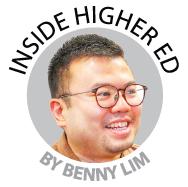LIFELONG learning is the process of gaining new knowledge and skills throughout one’s life.
In some situations, lifelong learning is about acquiring new skills/knowledge for the sake of pure interest.
More often than not, lifelong learning in today’s context is closely associated to one’s professional development, which includes learning new skills and/or upgrading qualifications for the betterment of career prospects.
The rapid development of technology has completely reshaped how work is done. There is also a growing need for cross-disciplinary skills and knowledge. In order to remain competitive, one has to constantly upgrade.
A friend of mine with a degree in culinary management has spent the last six years working for an in-flight catering company. He has been planning to pursue a master’s degree in supply chain management for two reasons. First, he wants to acquire knowledge in a completely new field relevant to his work. Second, a postgraduate qualification will certainly enhance his career prospects.
Some individuals are offered the opportunity to upgrade their studies with financial and time-off support from their employers.
For many others, taking on part-time studies (classes are usually in the evenings) could be a costly affair. Beyond the fees for the education, there are also opportunity costs, such as giving up time spent with family.
Developing a culture for lifelong learning is actually one of the strategic goals defined in Malaysia’s National Higher Education Strategic Plan in 2013. However, the higher education system is still rather unfriendly to working adults who want to upgrade themselves.
The Covid-19 pandemic has disrupted previous norms in teaching and learning. Even so, most institutions of higher learning still conform to synchronous learning, be it face-to-face, online, or mixed mode.
My friend has been delaying his plans to pursue the master’s degree as his schedule is rather erratic given the nature of his work, and he could not devote a fix day and time for study.
To effectively encourage a culture of lifelong learning, more flexible options must be made available, especially to lifelong learners who are working adults.
Let’s take reference from the UK system.
The Office of Qualifications and Examinations Regulation, or Ofqual, is a non-ministerial department of the UK government that regulates qualifications (many are vocational) in England.
A quick search on Ofqual register reveals over 15,000 qualifications developed by close to 230 awarding organisations. It should be noted that qualifications offered in universities are not under Ofqual’s jurisdiction.
Qualifications are tagged to a Level, from pre-tertiary all the way to doctoral levels. The levels denote the standard of achievement of the qualifications.
Qualifications are also assigned credits, which translate to notional learning hours. Learning, in this case, refers to a combination of different modes of learning, including face-to-face instructions, self-directed learning, and even work-based learning.
The UK subscribes to outcome-based education (OBE). Learners must submit a set of assignments for each unit and provide evidence of achieving the stated learning outcomes. The assignments usually require learners to apply and evaluate actual employment situations.
To earn a qualification, learners could study in centres approved by the awarding organisations. Some centres offer face-to-face instruction, while others grant learners access to pre-recorded lectures and learning materials.
Some awarding organisations allow learners to submit their assignments directly to them. In such situations, self-directed learning is encouraged. After all, working adults do have ready case studies for situational reflections.
The units are mostly modular, and there are flexibilities for learners to decide when to submit the assignments.
Flexibility aside, learners only pay a small fraction for an Ofqual-approved qualification, as compared to those offered by universities. Mature learners are also given considerations to be accepted into higher qualification levels.
Given well-defined national qualification framework in the, Ofqual-approved qualifications could often be used for same level or upward entry into conventional academic degree programmes offered by universities.
Imagine this:
Jack is a UK-based sous chef with 20 years of experience in a hotel. Despite having no formal tertiary education, he was accepted to undertake a 120-credit Level 7 Diploma in the field of management based on his wealth of experience.
Due to his busy schedule, he read up about management concepts through self-directed learning, alongside notes and pre-recorded lectures prepared by the centre. Expectedly, his management experience as a sous chef was used as case studies for the assignments.
Months later, he cleared all his assignment and received the Level 7 Diploma, which in the UK, is of an equivalent standard to that of a master’s degree. With the 120-credit Level 7 Diploma in Management, he could now proceed to complete the final stage of an MBA degree.
Similar to the UK, Malaysia’s higher education also practises OBE. Moreover, the Malaysian Qualifications Agency has developed clear qualification frameworks for higher education. In fact, our qualification levels and expected learning hours in Malaysia are rather similar to those in UK. Moreover, we also have well-defined policies for Accreditation of Prior Experiential Learning.
Simply put, Malaysia has the necessary infostructures and policies to make education more effective for lifelong learners. In fact, lifelong learners could also be a new market for private higher education institutions, since these institutions can be both the developer of the qualifications and the providers of flexi-modes of learning.
It’s time to better align our vocational and academic-based qualifications, alongside flexible learning options to encourage the spirit and culture of lifelong learning.
Dr Benny Lim is director of the Masters programme in communication and media studies, Università Telematica Pegaso (Italy), as well as an adjunct associate professor of cultural studies with the Chinese University of Hong Kong. The views expressed in this article are his own and do not represent the universities he is associated with.














